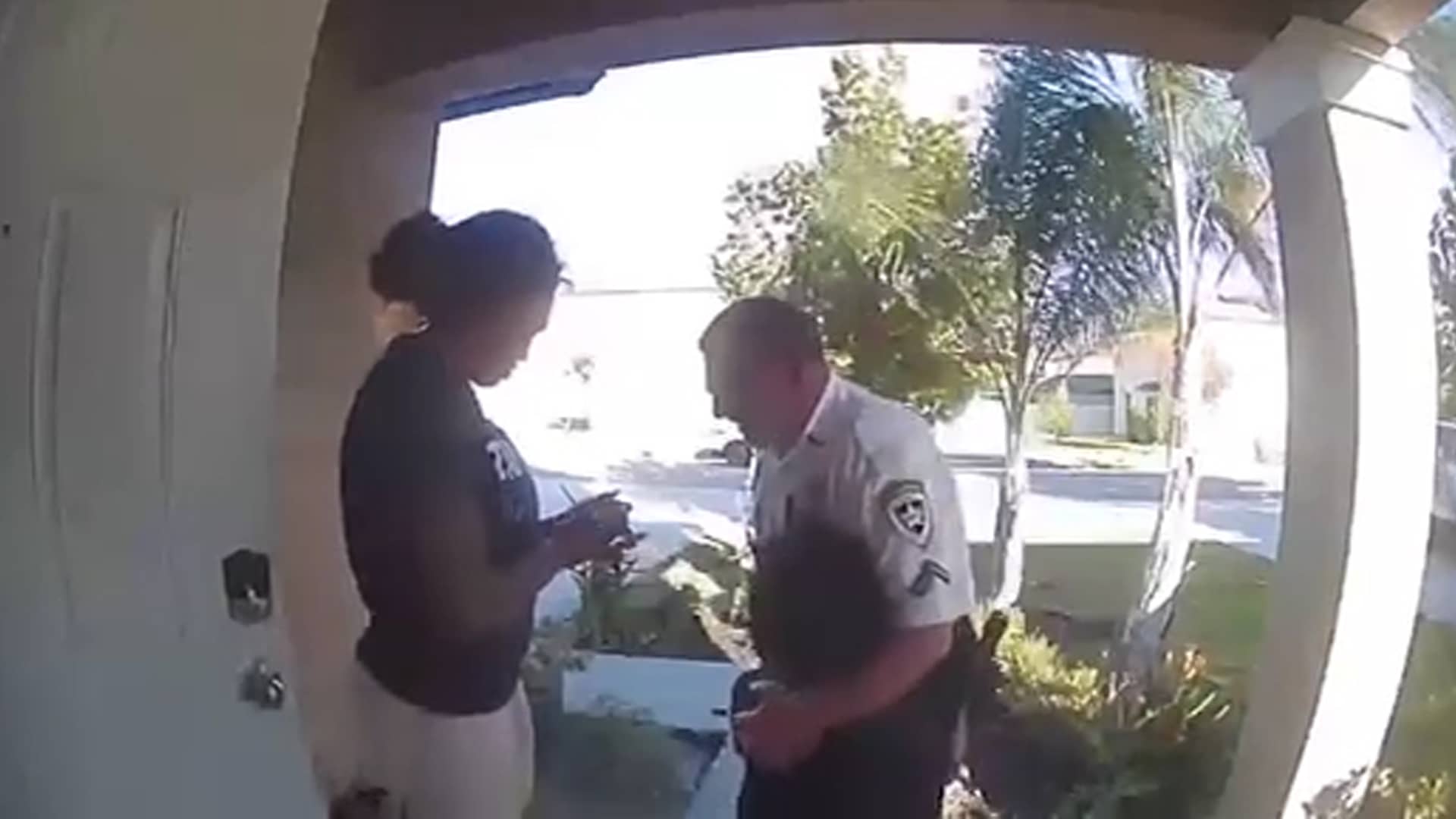Fraud Alert
Unmasking Facebook Pet Adoption Scam

Have you ever come across those heartwarming pet adoption posts on Facebook? The ones that tug at your heartstrings and make you want to open your home to a furry friend in need? Well, I certainly have. But as I immersed myself in the world of online pet adoptions, I stumbled upon something much darker lurking behind those adorable photos and heartwarming stories. It's what they call a Facebook Pet Adoption Scam. So, what is Facebook Pet Adoption Scam?
Facebook Pet Adoption Scam is a deceptive scheme that takes advantage of our love for animals and desire to give them a loving home. Scammers create seemingly heartwarming pet adoption posts on Facebook, using adorable photos and emotional stories to capture our attention. However, behind these seemingly innocent posts lies a sinister motive. The scammers aim to deceive unsuspecting animal lovers by tricking them into sending money or personal information. They exploit our empathy and vulnerability, preying on our good intentions. These scams can cause financial loss, emotional distress, and even identity theft.
The Rise of Facebook Pet Adoption Scam
In today's interconnected world, Facebook has unfortunately become a hotbed for fraud and scams, including the insidious Facebook Pet Adoption Scam. It's alarming to witness how these deceitful schemes have proliferated across the platform, preying on unsuspecting users who have a genuine desire to provide a loving home for animals in need. The consequences of falling victim to the Facebook Pet Adoption Scam can be devastating, both emotionally and financially.
Fraudsters and scammers have cunningly adapted to the digital landscape, exploiting the trust and vulnerabilities of Facebook users who are searching for a furry companion. They create fake profiles, craft heartwarming stories, and share enticing photos to lure their victims into their web of deception. These scammers target our empathy and our willingness to help, playing on our emotions to manipulate us into parting with our hard-earned money or personal information.
It's crucial to recognize the risks associated with the Facebook Pet Adoption Scam and understand the impact it can have on individuals and communities. By raising awareness about this fraudulent practice, we can empower ourselves and others to stay vigilant and protect against becoming victims. In the following sections, I will share my investigative journey into unmasking a specific Facebook Pet Adoption Scam, shedding light on their tactics and providing practical insights to help you navigate the treacherous waters of social media and ensure the safety of your heart and wallet.
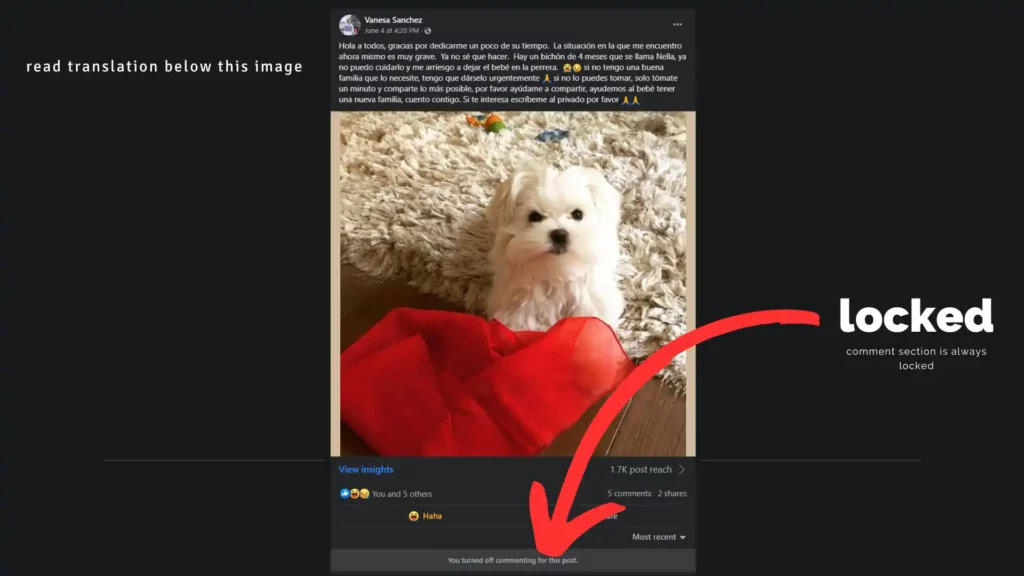
Unveiling the Facebook Pet Adoption Scam Scheme
In my relentless pursuit to expose Facebook fraud, I stumbled upon a specific fraudulent individual whose activities demanded my attention. It all started when I came across a seemingly innocent post in a Facebook group, offering an adorable dog for adoption (see photo above). Little did I know that beneath the surface of this heartwarming gesture lay a carefully orchestrated web of deception.
Driven by curiosity and a determination to protect others, I dug deeper into the profile of the person behind the post – a certain Vanesa Sanchez. As I ventured further, subtle inconsistencies began to emerge. The mismatch between the name Vanesa Sanchez and the vanity URL triggered my suspicion, sparking a flame of intrigue that ignited my investigative instincts.
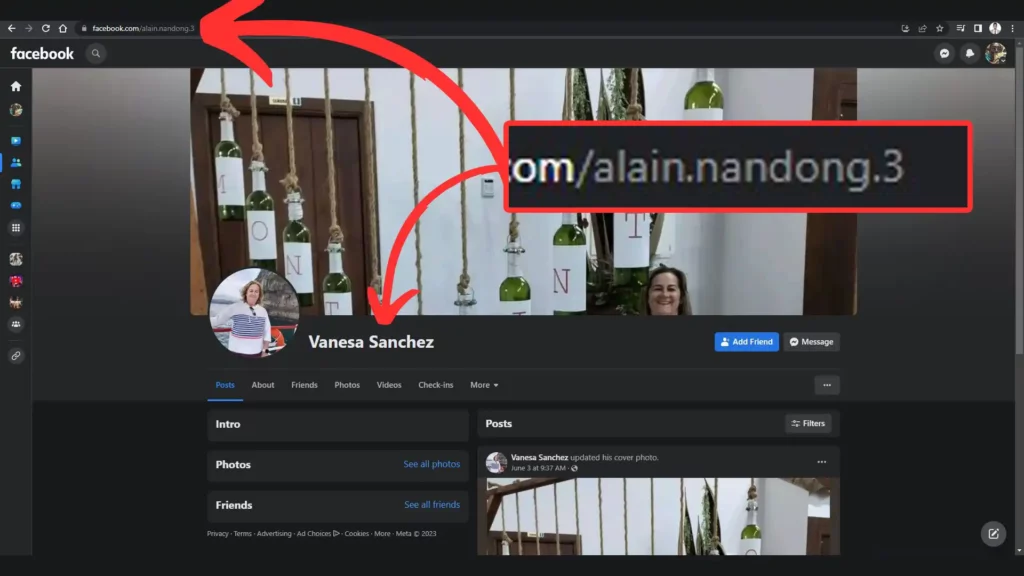
With a mission to uncover the truth, I embarked on an undercover operation. Assuming the role of a potential adopter, I initiated a conversation with Vanesa, carefully observing their every move. What unfolded before me was a clear diversion from genuine intentions. Rather than focusing on the welfare of the charming creature, Vanesa quickly shifted the discourse to unrelated matters, raising an alarm within me.
As our dialogue progressed, I couldn't help but notice the telltale signs of a fraudulent scheme. Vanesa's persistent inquiries about my address, the exorbitant pricing of a dog crate, and the insistence on payment through dubious channels like PaySafe served as glaring red flags. These tactics were cunningly crafted to exploit the trust and emotions of unsuspecting victims, enabling the scammer to profit at their expense.
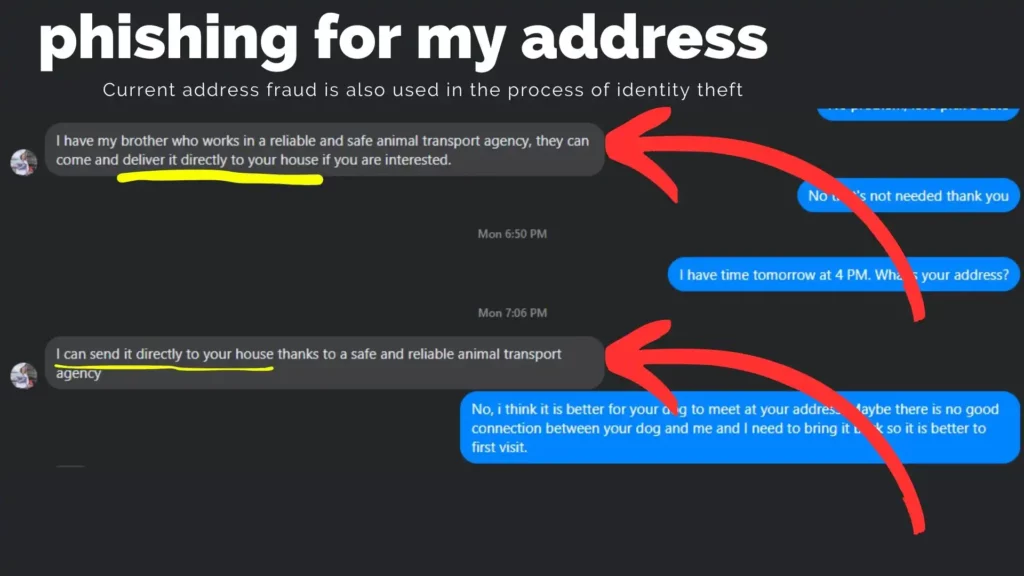
Unveiling the true nature of Vanesa's fraudulent scheme provided invaluable insights into the inner workings of the Facebook Pet Adoption Scam. By maintaining a watchful eye and engaging in cautious conversations, I successfully unraveled the layers of deception that concealed their nefarious activities.
Continue reading because I will shed further light on the specific tactics employed by this fraudster, equipping you with essential knowledge to identify similar patterns of deceit and safeguard yourself against the treacherous world of Facebook Pet Adoption Scams.
Infiltrating the Scammer's World
In my quest to expose the fraudulent activities within the realm of Facebook Pet Adoption Scam, I adopted a meticulous and strategic approach to infiltrate the scammer's world. Driven by a commitment to uncover the truth and protect others, I delved deeper into the intricate web of deceit.
Engaging with the fraudster, I carefully crafted my responses to strike a delicate balance between appearing genuine and concealing my true intentions. It was crucial to navigate the conversation with precision, using strategic questioning and active listening to gain valuable insights into their methods and motives.
To gather concrete evidence of their fraudulent practices, I employed various tactics. One crucial step was the meticulous capture of screenshots, documenting each interaction with meticulous attention to detail. These screenshots became crucial pieces of evidence that exposed the true nature of their intentions and the manipulative techniques employed.
Throughout my engagement, I remained acutely aware of the red flags and suspicious behavior exhibited by the fraudster. The relentless pursuit of personal information, insistence on non-standard payment methods, and minimal concern for the welfare of the dog raised significant alarm bells, serving as clear indicators of their deceptive agenda.
I have developed a simple software that allows me to track the exact location of a person once they click on a provided link. Despite my attempts to convince the scammer to click on the link, the paranoia grew too strong, and the scammer even resorted to lying, claiming that the page was not functioning properly and making up various excuses not to visit my link. This incident serves as a testament to the lengths fraudsters will go to protect their true identity and avoid detection. It also highlights the importance of remaining cautious and skeptical when engaging with unknown individuals online.
Furthermore, in the screenshot below you witness the fraudster's paranoia became increasingly apparent as our interaction progressed. My resistance to clicking on a link, accompanied by feeble arguments to avoid it, only solidified their determination to conceal their true identity and motives.
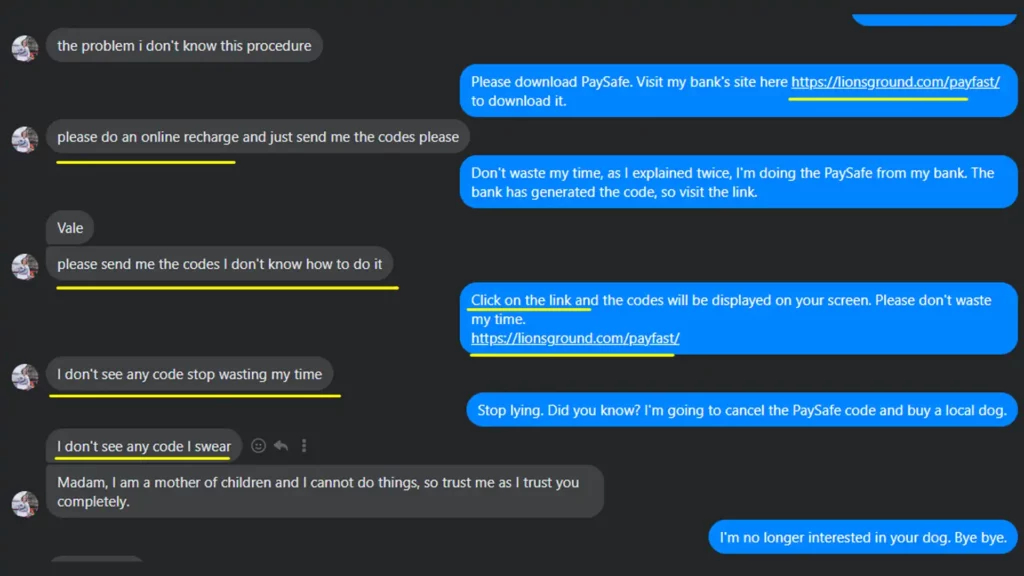
By meticulously gathering evidence and maintaining unwavering vigilance, I successfully unraveled the intricate web of deception spun by the scammer. Each red flag encountered served as a valuable lesson, fortifying my resolve to shield others from falling victim to similar schemes.
Keep reading because I will delve deeper into the specific tactics employed by this fraudster, equipping you with the knowledge, insights, and practical tools necessary to recognize red flags, stay one step ahead, and effectively safeguard yourself against the lurking dangers of the Facebook Pet Adoption Scam.
Exposing the Facebook Pet Adoption Scam Tactics
In this section, we will unveil the deceptive tactics and techniques employed by fraudsters within the realm of the Facebook Pet Adoption Scam. By shedding light on their manipulative practices, we aim to empower readers with the knowledge to recognize and safeguard themselves against these malicious schemes.
The fraudster I encountered on Facebook skillfully employed psychological manipulation, emotional appeal, and misinformation to deceive their targets. The main goal was to exploit vulnerable individuals who were seeking to provide a loving home for the advertised dog.
One of their prominent tactics involved crafting a heart-wrenching story accompanied by a captivating photo of the innocent animal. By tugging at the heartstrings of potential victims, they created a sense of urgency and evoked sympathy. These emotional triggers often clouded judgment, making it easier for the fraudster to take advantage of their targets.
To maintain control over the narrative and isolate their victims, the fraudster disabled the comment section under their posts. By preventing others from sharing warnings or raising concerns publicly, they aimed to maintain a veil of secrecy and continue their deceit without interference.
Examples of their fraudulent practices included attempting to obtain personal information, such as addresses, under the pretense of arranging safe delivery through a purported “reliable and safe animal transport agency.” This tactic played on the victim's desire to ensure the dog's well-being while unknowingly compromising their own security.
The scammer also sought to exploit financial vulnerabilities by suggesting the purchase of a dog crate at an inflated price. Their insistence on using unconventional payment methods like PaySafe raised additional suspicions. These tactics were carefully crafted to extract money from their victims, capitalizing on trust and the eagerness to provide a loving home for the dog.
By exposing these specific examples and providing evidence, such as screenshots of conversations, we aim to expose the manipulative techniques employed by fraudsters within the Facebook Pet Adoption Scam. It is crucial to remain vigilant, recognize these red flags, and arm ourselves with knowledge to protect against falling victim to these scams.
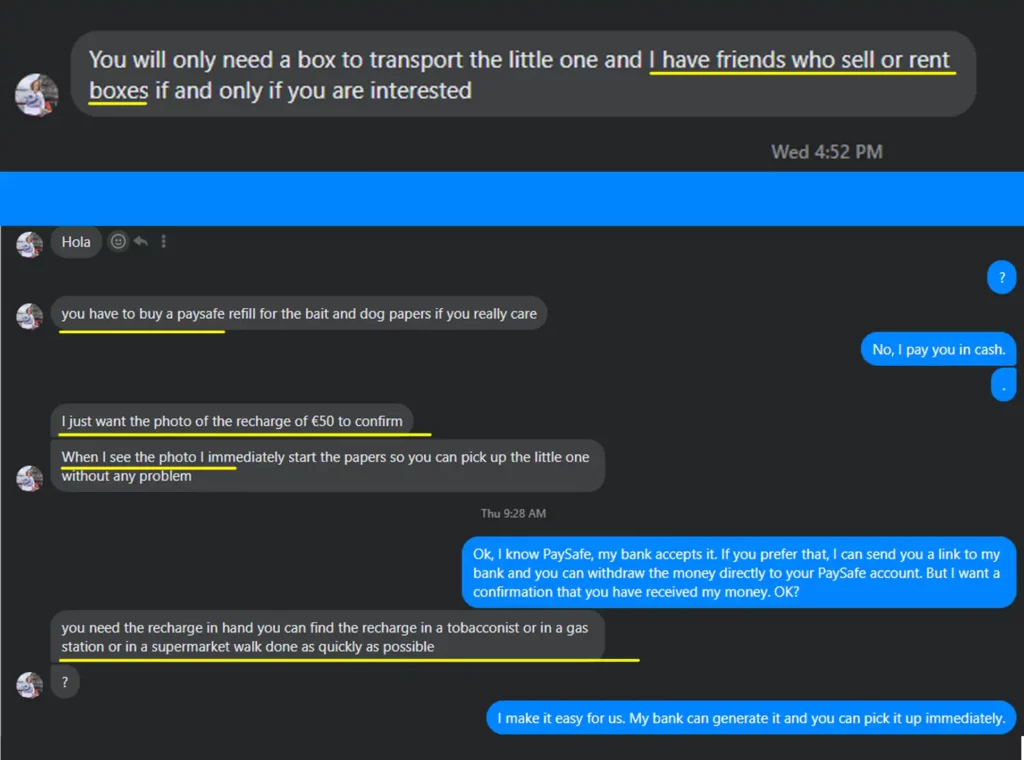
Spreading Awareness and Preventive Measures
In this section, we will underscore the criticality of raising awareness about the Facebook Pet Adoption Scam and provide practical tips and strategies to help you safeguard yourself from falling victim to these scams. By equipping yourself with knowledge and adopting preventive measures, you can navigate the digital landscape confidently and mitigate the risks associated with Facebook fraud.
Raising awareness is pivotal in combating the Facebook Pet Adoption Scam. By sharing information about the deceptive tactics employed by scammers, we empower others to recognize and avoid potential dangers on the platform. Share this article with your friends, family, and social media connections to ensure that more individuals are informed about the lurking threats on Facebook.

Here are some essential tips and strategies to fortify your defenses against scams:
- Stay Vigilant: Remain alert and attentive to any suspicious or unusual activity on Facebook. Trust your instincts and exercise caution when encountering potentially fraudulent offers or messages.
- Embrace Skepticism: Cultivate a healthy dose of skepticism when engaging with unfamiliar individuals online. Remember that not everything you see or read on social media is authentic. Take the time to verify information and assess the credibility of the source.
- Enhance Privacy Settings: Take control of your privacy by reviewing and strengthening the settings on your Facebook profile. Restrict access to personal information and limit the visibility of your posts and updates.
- Think Before Sharing: Exercise caution when sharing personal details, photographs, or sensitive information online. Consider who will have access to the information and how it could be exploited by malicious individuals.
- Verify Identities: Before engaging in transactions or interactions with potential sellers or adopters, verify their identities and conduct thorough research. Look for consistent information, mutual connections, and any potential red flags or warning signs.
- Trust Your Intuition: Trust your instincts and pay attention to any gut feelings that something may be amiss. If an offer or situation appears too good to be true, exercise caution and seek additional verification.
- Report Suspicious Activity: If you encounter any fraudulent or suspicious activity on Facebook, promptly report it to the platform. Reporting not only protects yourself but also helps prevent others from falling victim to the same scam.
Remember, maintaining a safe experience on Facebook requires a combination of vigilance, skepticism, and proactive measures. By implementing these strategies and staying informed, you can minimize the risk of becoming a target and safeguard your personal information and well-being.

Reporting and Taking Action
In this section, we will explore the significance of reporting fraudulent activity related to the Facebook Pet Adoption Scam, highlight the steps taken to report the fraudulent person and their activities, and encourage readers to join the fight against Facebook fraud.
Reporting fraudulent activity is a crucial step in combating the Facebook Pet Adoption Scam and protecting ourselves and others from falling victim to these schemes. By reporting suspicious accounts, posts, or interactions, we not only safeguard ourselves but also contribute to creating a safer online environment for everyone.
During my investigation, I realized the importance of taking immediate action when encountering fraudulent behavior. Here are the steps I followed to report the fraudulent person and their activities:
- Document Evidence: Gather all relevant evidence, including screenshots of conversations, posts, and any other supporting information that establishes fraudulent intent.
- Report to Facebook: Utilize the reporting tools provided by Facebook to report the suspicious account and any associated fraudulent posts or activities. Provide detailed information about the fraudulent behavior and include the collected evidence to strengthen your report.
- Engage the Community: Share your experience with trusted individuals or online communities dedicated to combating fraud and scams. Seek guidance, support, and additional resources from these communities to enhance the reporting process.
- Report to Authorities: In cases where criminal activity, such as identity theft or financial fraud, is evident, report the incident to local law enforcement or relevant authorities. Provide them with the gathered evidence and any additional information that can assist in their investigation.
By taking these actions, we not only hold the fraudsters accountable but also contribute to a safer online environment for all users. However, our responsibilities extend beyond reporting alone. We must encourage others to report suspicious activity and actively participate in the collective effort against Facebook fraud.
If you encounter any suspicious accounts, posts, or interactions on Facebook, don't hesitate to report them. Encourage your friends, family, and online connections to do the same. By reporting suspicious activity and spreading awareness, we build a robust network of vigilant users actively involved in combating fraud.
FAQ
What is the Facebook Pet Adoption Scam?
The Facebook Pet Adoption Scam involves malicious internet users who post attractive pictures of puppies or kittens and call for their adoption. They often ask for payment to cover transport costs for an animal that never arrives.
How do scammers justify these calls for adoption?
Scammers use various arguments to justify the calls for adoption. Some common excuses include the death of the owner, allergies in children, or relocation due to professional reasons.
What happens after one shows interest in adopting the pet?
If you show interest in adopting, the scammer will provide detailed information about the pet and the adoption process. They will then ask for €200 to cover transportation costs. The scammer will stop communicating with you if you offer to personally pick up the pet.
How do scammers make the scam appear credible?
To make the scam appear credible, an alleged transport agency contacts the potential adopter by phone or email. The agency might even use an email address that includes the name of a legitimate airline but is attached to a Gmail account. The agency then asks the potential adopter to purchase a €200 prepaid card (PCS coupon) as a guarantee and send them proof of purchase within an hour.
How can one avoid falling for this scam?
To avoid falling for this scam, be cautious of adoption posts with disabled comments and a lack of detailed information. Also, if the seller insists on using untraceable payment methods like prepaid cards, it's likely a scam.
Is this scam only related to dogs?
No, the scam is not only related to dogs. There have been instances where scammers have fraudulently posed as representatives of cat rescues to “adopt” out cats. These cats are often not vaccinated, spayed or neutered, and can end up producing unwanted litters of kittens.
What should one do if they suspect a scam?
If you suspect a scam, it's advised to contact the local authorities or the organization the scammer claims to represent. For example, if someone is claiming to represent Desert Cat Rescue, you should contact them directly to confirm the legitimacy of the adoption.
What is the usual mode of communication in these scams?
The scammers usually communicate through private messages on Facebook. After showing interest in an adoption post, a potential adopter will receive long paragraphs with all the necessary information about the pet and the adoption process. The text is often identical across various scams, suggesting the same group of scammers may be behind them.
How often are these scams reported?
The frequency of reported scams can vary by region. For instance, in the Bas-Rhin department of France, an average of one to two complaints per month were reported. However, this could be higher in other regions or countries. It's important to note that not all victims may report the scam, so the actual frequency could be higher.
Have there been any successful investigations against these scams?
Investigations into these scams often lead to dead ends, partly due to the difficulty in tracing the untraceable prepaid cards used for payments. In some cases, the suspects were found to be located in West Africa, where judicial cooperation can be challenging. Consumer associations and police departments regularly issue warnings about these scams and advise against the use of such prepaid cards.
Conclusion
Throughout this investigative journey into unmasking the Facebook Pet Adoption Scam, we have shed light on the deceptive practices employed by fraudsters and emphasized the need for vigilance and awareness when engaging online. By being informed and proactive, we can protect ourselves and others from falling victim to these schemes.
The incidents I encountered while delving into the world of the Facebook Pet Adoption Scam showcased the dangers lurking on social media platforms. The manipulation tactics, emotional appeals, and financial exploitation used by fraudsters are alarming. It is essential to recognize the red flags and stay alert to potential scams.
To combat the Facebook Pet Adoption Scam effectively, we must take action. Report any suspicious accounts, posts, or interactions to Facebook and relevant authorities. By doing so, we contribute to a safer online environment and help prevent others from becoming victims.
Remember, staying safe on Facebook and other social media platforms requires ongoing vigilance. Stay informed about the latest scam techniques, protect your personal information, and engage in critical thinking. By empowering ourselves with knowledge and promoting awareness, we can navigate the digital landscape with confidence.
Together, let's stand against the Facebook Pet Adoption Scam. By staying vigilant, taking action, and spreading the word, we can create a safer online community for everyone. Report fraud, protect yourself, and help others do the same. Stay safe, and remember to always be cautious when engaging online.










